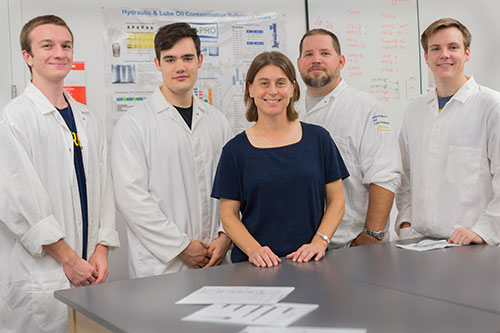 Professor Ashlie Martini is one of only a few university researchers in the country who work on tribology — the study of friction, lubrication and wear.
Professor Ashlie Martini is one of only a few university researchers in the country who work on tribology — the study of friction, lubrication and wear.
Her work and her willingness to develop partnerships has led to a pilot program with the Chevron Products Company that will allow three undergraduate students and one graduate student to conduct research for one of the world’s largest energy companies in a specialized field.
“Chevron is interested in promoting lubrication science as well as attracting talented new hires, so we view UC Merced as a good school for developing a cooperative relationship,” Chevron Manager for Driveline Technology Jack Zakarian said.
In response to demands for higher mechanical efficiency, Chevron is developing lubricants with much improved cleanliness and reduced tendency to foam. Because foam reduces efficiency, lubricants have anti-foaming agents in them that work well, Martini said. But when measured with the more sensitive optical particle counters now in use, the anti-foaming agents can look like dirt.
“There are lots of ways to solve the problem, including optimized blending methods or finding ways to filter the dirt without losing the additives,” said Martini, who’s with the School of Engineering. “I wanted to find a project and a partnership that would allow the students to make real contributions. If we can help solve this problem, that’s a big contribution.”
Fourth-year student Cory Mercer said he didn’t even know what tribology was until he joined Martini’s lab.
“I wanted to get research experience and learn how to apply what I was learning in my mechanical engineering classes,” Mercer said. Now he’s getting paid to work on the Chevron partnership, learning a new discipline and potentially making connections for the future.
“Most students don’t get an experience like this,” he said.
The students are exposed to real-world applications, Zakarian said, and they learn about research and development.
“One of the most important things to learn at school is ‘how to learn,’” he said. “The information needed for our projects cannot be conveniently found in textbooks or online. This forces the students to think independently and to be creative in their search for knowledge. Chevron benefits by getting answers to fundamental questions about our products and performance that we would not normally have time to pursue in-house.”
Nick Walters, a third-year student who has been interested in surfaces, friction and mechanical fatigue for several years, said he’s excited to be part of the project, and not just because it’s in his wheelhouse.
“I’ve applied for an internship at Argonne National Laboratory to work on tribology projects, and I needed this particular training from Professor Martini to be eligible,” he said.
Chevron, like many companies, has more projects to work on than people and time available. Zakarian said the company, which already hires an intern from UC Merced each summer, felt this would be an effective partnership as well. If the pilot goes well, the partnership could expand.
“Students with R&D experience on their resumes should be in better positions for work at technology companies or graduate schools,” he said. “The exposure of Professor Martini’s students to Chevron people can also enhance their chances for future hire.”
“Tribology is not taught as part of standard undergraduate curriculum, and there are not many research groups in the U.S. where undergraduate students can get involved in the topic,” Martini said. “So any students with a background in tribology have a big advantage when applying for positions in that area.”



